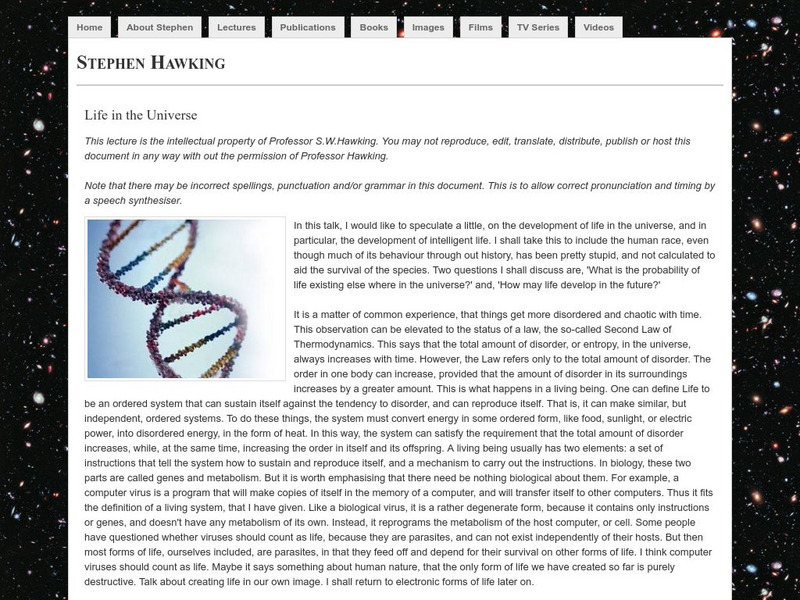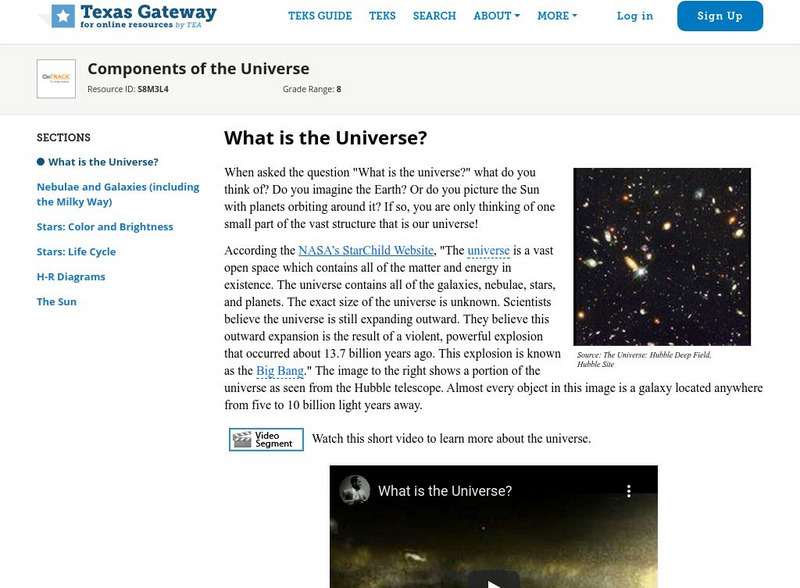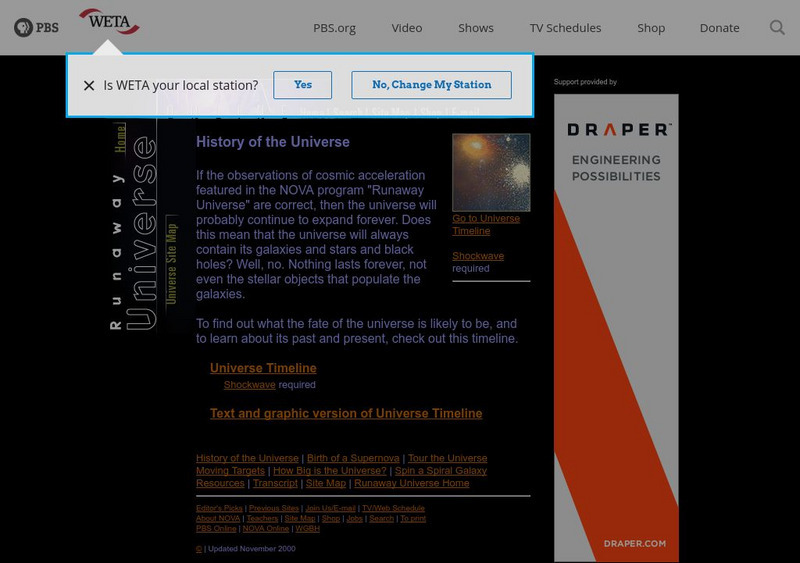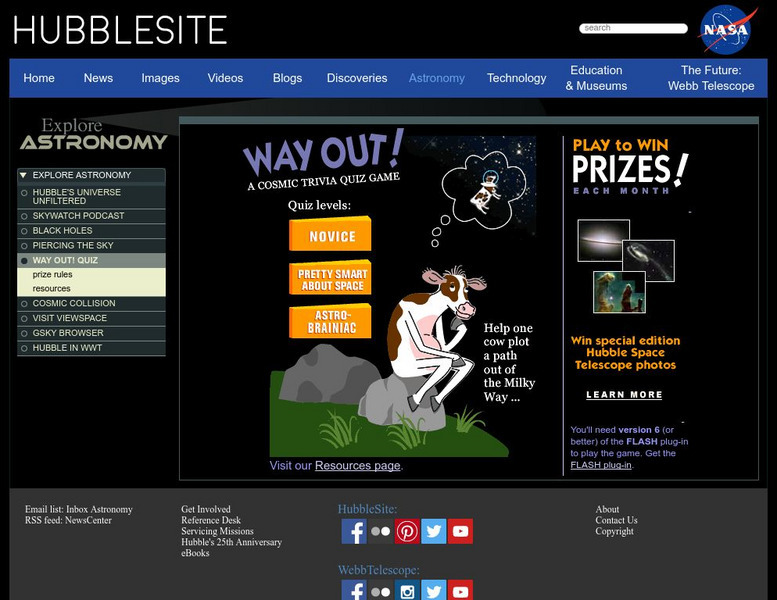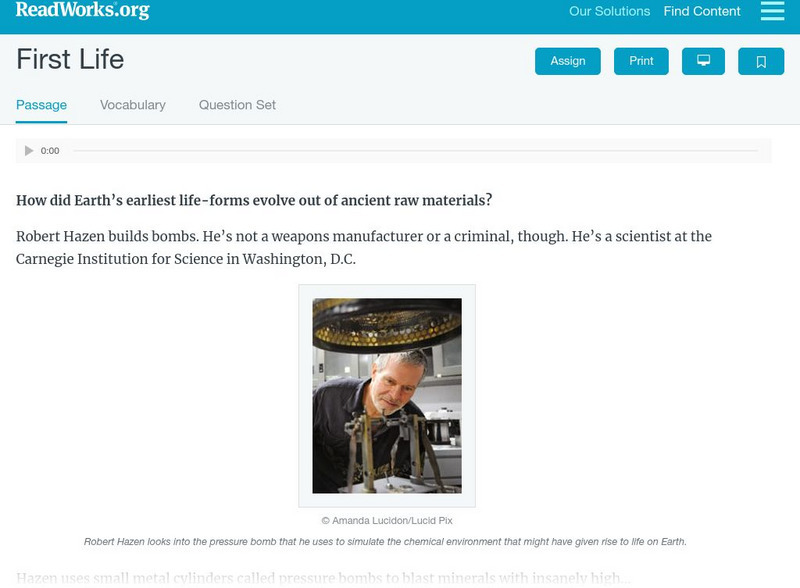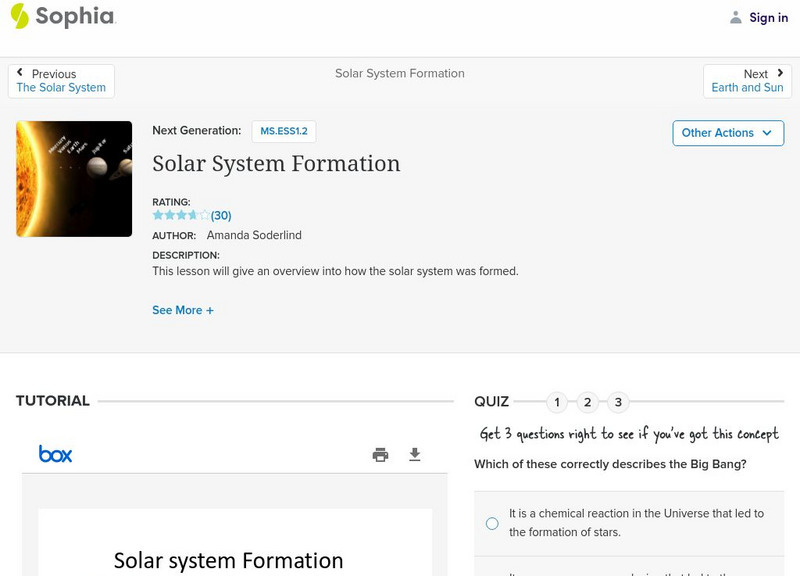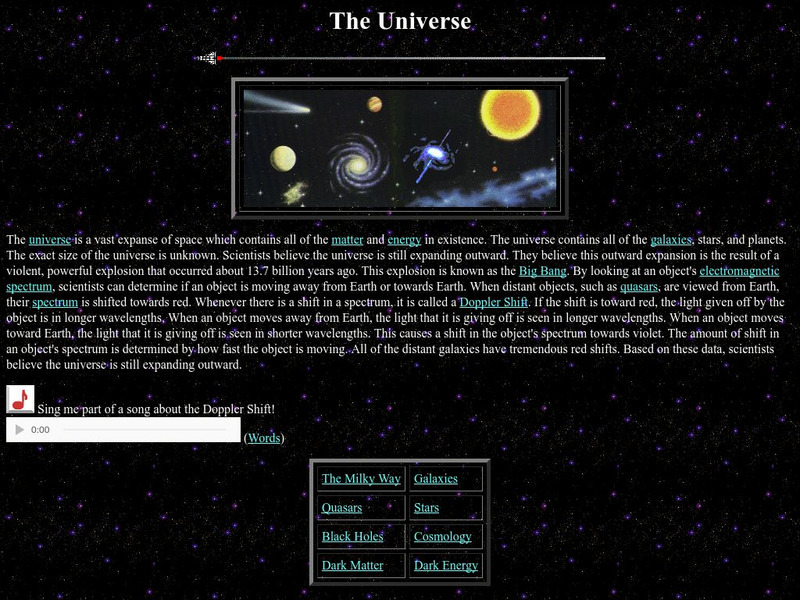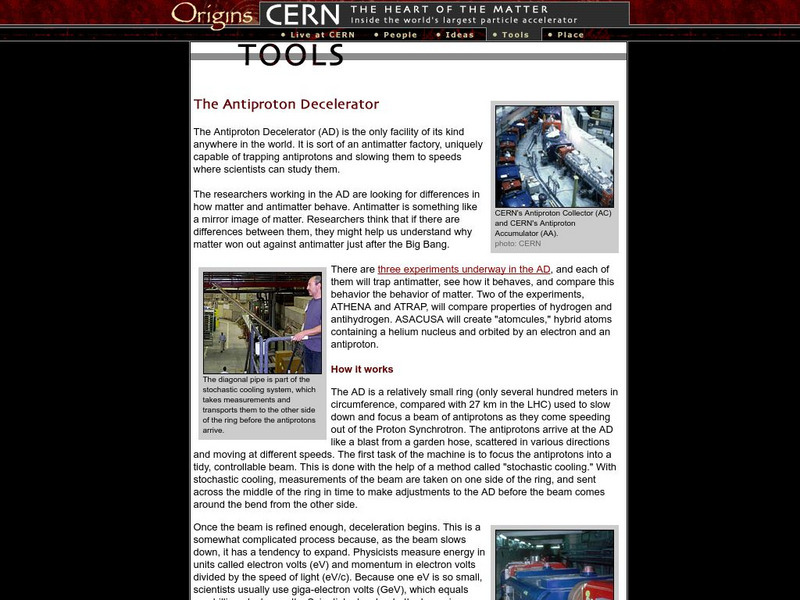Lawrence Berkeley National Laboratory
Berkeley Lab: Expansion of the Universe
Brief explanation of the creation and expansion of the universe otherwise known as the Big Bang.
Other
Stephen W. Hawking: Lectures: Life in the Universe
This lecture covers the topic of life now and into the future, including the role genetic engineering will play.
National Science Foundation
National Science Foundation: Astronomy and Space: Research Overview
Explore some of our most fundamental questions about space exploration with this research overview collected by scientists at the National Science Foundation. Additionally, experience deep space first-hand with telescope interactives.
Texas Education Agency
Texas Gateway: What Is the Universe?
The following tutorial is an explanation of what the universe is composed of.
NASA
Nasa: Image Science Center: Ask the Space Scientist
A NASA scientist, Dr. Sten Odenwald, answers many students' questions. Topics include planets, galaxies, black holes, the origin of the universe, and common misconceptions about space.
PBS
Pbs Teachers: Mysteries of the Universe
Consider the issues surrounding the world of space exploration including the new fields of archaeoastronomy and astrobiology. Investigate zero gravity, the Big Bang theory, life in space and how sound travels in a vacuum.
Exploratorium
Exploratorium: Cern: Antimatter
A wonderfully written non-technical introduction to antimatter, as well as a brief discussion of the investigation into the asymmetry between the quantities of matter and antimatter observed in our universe.
PBS
Pbs: Nova Online: History of the Universe
PBS site explores the history of the Universe by providing users with a Universe Timeline exploring different theories. Site also contains links to a tour of the Universe, birth of a Supernova, additional resources and much more.
CK-12 Foundation
Ck 12: Biology: How Earth Formed
[Free Registration/Login may be required to access all resource tools.] Describes the Earth's formation.
CK-12 Foundation
Ck 12: Biology: How Earth Formed
[Free Registration/Login may be required to access all resource tools.] Describes the Earth's formation.
Space Telescope Science Institute
Hubble Site: Way Out!
Can you help a cow plot a path out of the Milky Way? This hilarious space game is for all ages and is offered by HubbleSite. Users may pick their level of expertise and can choose from novice, pretty smart about space, or an astrobrainiac.
Australian Museum
Australian Museum: The Earth: The Universe
Basic information about the universe, its origin and composition. Also includes information about galaxies, stars, and the sun.
Read Works
Read Works: Crash Test
[Free Registration/Login Required] An informational text about a scientist who studies collisions. A question sheet is available to help students build skills in reading comprehension.
Read Works
Read Works: First Life
[Free Registration/Login Required] This informational text passage explains the pressure-bomb experiments of Robert Hazen and the origins of life. This passage is a stand-alone curricular piece that reinforces essential reading skills...
Sophia Learning
Sophia: Solar System Formation
An illustrated slide show highlighting the origin and make-up of our solar system.
NASA
Nasa Star Child: The Universe (Level 2)
This site provides a description of the universe and what it contains. Includes links to definitions, activities, and an audio song. Printable version available.
TED Talks
Ted: Ted Ed: Three Ways the Universe Could End
Do we know how our universe is going to end? Venus Keus explores cosmologists' three possible scenarios.
Exploratorium
Exploratorium: Cern: The Antiproton Decelerator
Explains the function of the Antiproton Decelerator, a device at the European Center for Nuclear Research used to "slow down" bunches of antiprotons for use in experiments.
Cosmos 4 kids
Cosmos4 Kids: Universe: Origins of the Universe
How did our universe get here? A beginner's research page answers this question for young learners.
PBS
Pbs Teachers: Scientific American: Science Italian Style: Where's the Matter?
Explore some of the hard questions and issues related to scientific research and project funding. Role-play a mock Congressional hearing to discuss the wisdom of a new scientific venture with no perceivable practical use to mankind.
Curated OER
Wikipedia: National Historic Landmarks in New Jersey: Horn Antenna
Arno Penzias and Robert Wilson discovered the microwave background radiation that permeates the universe using this antenna. This work earned them the 1978 Nobel Prize for Physics and led to the confirmation of the Big Bang theory.
Khan Academy
Khan Academy: Isaac Newton
A biography of the scientist that developed the theory of gravity and founded the three basic laws of motion, Isaac Newton.
Khan Academy
Khan Academy: Nicolaus Copernicus
Learn about the life of the man who set off a scientific revolution with his sun centered theory in this article that details the biography of Nicolaus Copernicus.
Khan Academy
Khan Academy: Claudius Ptolemy
Claudius Ptolemy believed the Earth was the center of the universe. Learn about his theories and life in this biographical article.
Other popular searches
- The Big Bang Theory
- Space Big Bang Theory
- Scientific Big Bang Theory
- Science Big Bang Theory
- Space: Big Bang Theory
- Big Bang Theory Experiments
- Geography Big Bang Theory
- Space\: Big Bang Theory
- Space\\: Big Bang Theory



